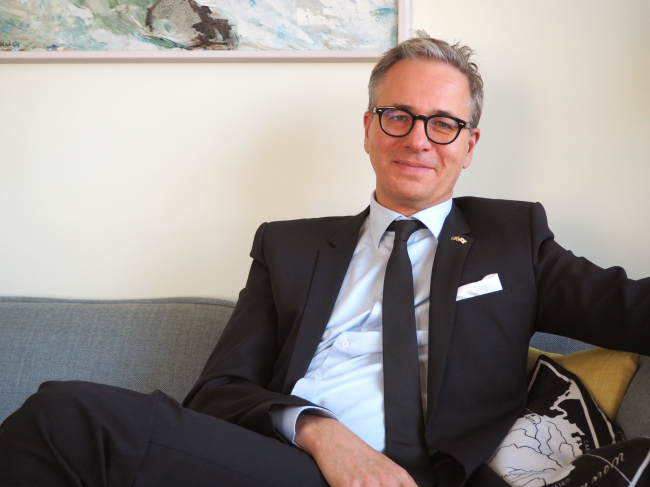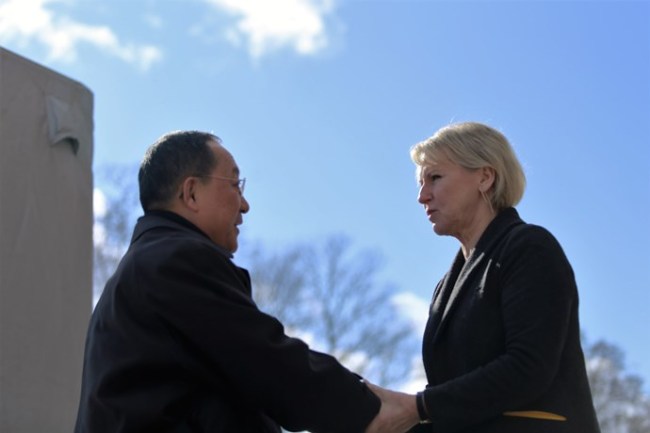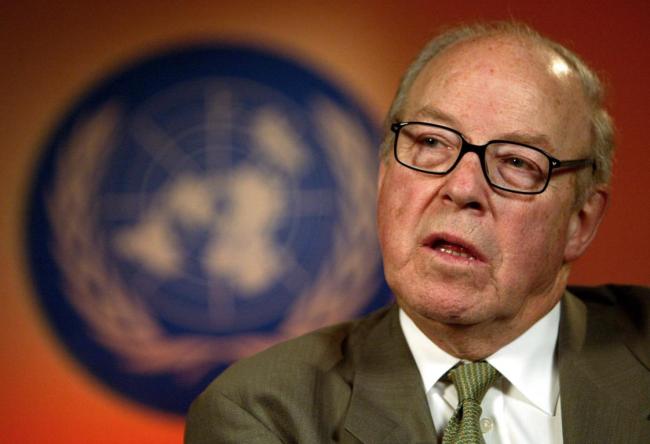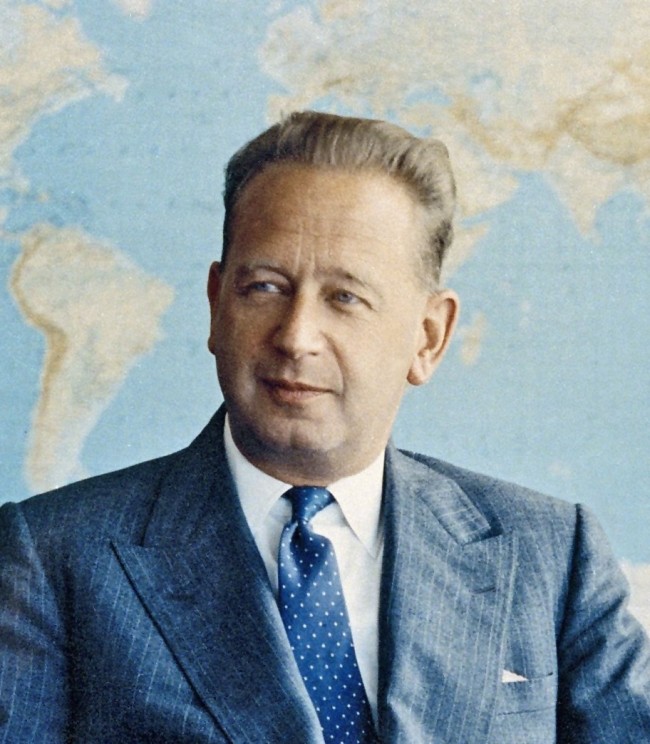[Herald Interview] How Sweden’s trustworthy diplomacy aids inter-Korean dynamics
“Our continuing commitment to humanitarianism around the world has given us a profile of an honest broker, with no big self-interest or ambition.”
By Joel LeePublished : Oct. 29, 2018 - 17:27

Sweden’s diplomacy -- centered on neutrality, peace and humanitarianism -- has won plaudits the world over. Some pundits say it goes deeper than other Nordic nations’ individual commitments.
As the two Koreas step up their efforts to achieve reconciliation and advance cooperation, Sweden can play a special role as an honest broker and authority on disarmament and nonproliferation, according to the country’s top envoy here.
“Sweden has been an honest broker favoring neutrality and nonalignment as a diplomatic policy,” said Ambassador Jakob Hallgren in an exclusive interview with The Korea Herald. “As a result, we have enjoyed peace for more than 200 years, since the Swedish-Norwegian War of 1814. This has allowed the gentle building of relations, institutions and trust between our government and people through a social contract.”
Hallgren started his ambassadorship -- his first -- here in September. He served as the deputy director of the Stockholm International Peace Research Institute from 2012 to 2018, and as head of the humanitarian division and the division for conflict issues at Sweden’s Ministry of Foreign Affairs. He has worked closely with the European Union, the United Nations and various other international organizations in conflict mediation, peace-building, security-systems reform, disarmament, humanitarian operations and disaster-risk reduction.

Sweden is the first Western nation to establish diplomatic relations with North Korea, having done so in 1973, and to set up an embassy in Pyongyang in 1975. On the strength of its credibility, Sweden has often brokered diplomacy between the North and the West. The meeting between North Korean Foreign Minister Ri Yong-ho and his Swedish counterpart, Margot Wallstrom, in Stockholm in mid-March led to the release in May of three American prisoners formerly held by the communist state.
Wallstrom also “underlined the need for North Korea to dismantle its nuclear arms and missile program in line with several Security Council resolutions.”
Through its Pyongyang embassy, Sweden represents the consular interests of the US, Australia, Canada and the Nordic countries. The country is also a member of the Neutral Nations Supervisory Commission, an agency created out of the Korean War Armistice of 1953 and tasked with overseeing the truce mechanism’s implementation through inspection and investigation.
Five Swedish military officers led by a general or admiral along with five Swiss representatives are stationed near Panmunjom. Their main task is to ensure that the cease-fire is enforced through their physical presence and monitoring. The promotion of detente and security in the JSA also falls under the scope of the NNSC’s activities.
On Sept. 22, Sweden and Switzerland expressed their willingness to send a team of experts, upon request, to inspect North Korea’s nuclear and missile-testing sites.
“Sweden has a long history of collaboration with the International Atomic Energy Agency,” he said, mentioning former Swedish Foreign Minister Hans Blix, who headed the agency from 1981-97 and was in charge of inspecting Iraq’s alleged weapons of mass destruction before the 2003 invasion. Blix’s team found no evidence of WMDs in Iraq.

Hallgren also pointed to Swedish diplomat Rolf Ekeus -- a representative to the Conference on Disarmament in Geneva who has worked with various disarmament committees and commissions. Ekeus directed the UN Special Commission on Iraq from 1991-97 as well as UN disarmament observers in Iraq after the Gulf War. In 2002, Ekeus told Swedish daily newspaper Svenska Dagbladet that he had resisted attempts by Washington to use the commission to perform espionage in Iraq.
“We also have a long list of technical inspectors,” said the envoy, adding that Sweden has provided technical instruments to the Comprehensive Nuclear Test-Ban Treaty Organization in Vienna. “Swedish inspectors, technicians and diplomats have worked together in disarmament and nonproliferation for a long time.”
From 1945 to 1972, the Swedish government ran a clandestine nuclear weapons program under the guise of civilian defense research to counter the Soviet threat. The program was abandoned in 1966 following a nationwide protest and debate, and Sweden signed the Non-Proliferation Treaty in 1968, eventually terminating the program in 1972.
“We have always had a very international outlook on our foreign policy, involving ourselves in UN and other multilateral affairs,” Hallgren said, mentioning Swedish economist and diplomat Dag Hjalmar Agne Carl Hammarskjold -- the UN’s second secretary-general. Hammarskjold, who died in an airplane crash under suspicious circumstances in 1961, was posthumously awarded the Nobel Peace Prize. “Plus, our continuing commitment to humanitarianism around the world has given us a profile of an honest broker, with no big self-interest or ambition. To this day, Sweden is not a member of the North Atlantic Treaty Organization, although we have close collaboration with it.”
As an EU member state, Stockholm “fully supports” the EU’s position on multilateral affairs and participates in drafting policies, including its “critical engagement” policy toward North Korea. The policy is aimed at engaging Pyongyang through dialogue and incentivizing the regime to denuclearize. “Critical engagement means we need to stand resolutely behind UN Security Council resolutions, also EU autonomous sanctions,” according to Hallgren. “Equally important is having dialogue. It is our duty to discuss things with parties we don’t necessarily agree with.”

Stockholm and Seoul will celebrate 60 years of diplomatic relations next year.
The first Swedes came to Busan on Sept. 23, 1950, to set up a field hospital, and ever since, Swedish officials and businesspeople have been in South Korea through various channels.
“Sweden used to be a poor country up until the early 20th century. But through our social contract, we were able to build a strong economy and welfare state at the same time,” the Swede explained. “We are a liberal, market-oriented economy, and similarly to South Korea, we also have big conglomerates -- Volvo, Erisson, Atlas Copco, Ikea, Scania AB and others. At the same time, we are a welfare state that taxes its citizens progressively. This is possible because people trust the government and are happy to pay taxes, knowing they get something back in return.”
Hallgren explained that Sweden’s comprehensive reforms in the early 1990s were intended to promote globalization and a move up the value chain, while pruning welfare services.
“Our shipping and shipbuilding industry that supported the Swedish economy from the 1950s through 80s saw its demise since the 1970s due to competition from abroad, including South Korea,” he said. “We stopped giving out subsidies to the industry and invested in education, innovation and services. Amazingly, some 10 to 15 years later, a whole range of diverse and competitive small and midsized companies were born.”
Currently, some 40 percent of the Swedish gross domestic product comes from international trade, and exports and imports are equally important, he added.
“It is a huge honor to serve in South Korea, a country with a spectacular history and achievements, and continuing the work of former Swedish ambassadors,” the diplomat said. “Our countries maintain a long list of collaborations in industries, automotive parts manufacturing, machinery, shipping, high-tech electronics and telecommunications, mining equipment, furniture, music, culture, food and creative industries.”
“My job is to facilitate and promote these links,” he added, “and to see how we can create synergy and improve inter-Korean relations.”
By Joel Lee (joel@heraldcorp.com)








![[Kim Seong-kon] Democracy and the future of South Korea](http://res.heraldm.com/phpwas/restmb_idxmake.php?idx=644&simg=/content/image/2024/04/16/20240416050802_0.jpg&u=)







![[KH Explains] Hyundai's full hybrid edge to pay off amid slow transition to pure EVs](http://res.heraldm.com/phpwas/restmb_idxmake.php?idx=652&simg=/content/image/2024/04/18/20240418050645_0.jpg&u=20240418181020)

![[Today’s K-pop] Zico drops snippet of collaboration with Jennie](http://res.heraldm.com/phpwas/restmb_idxmake.php?idx=642&simg=/content/image/2024/04/18/20240418050702_0.jpg&u=)